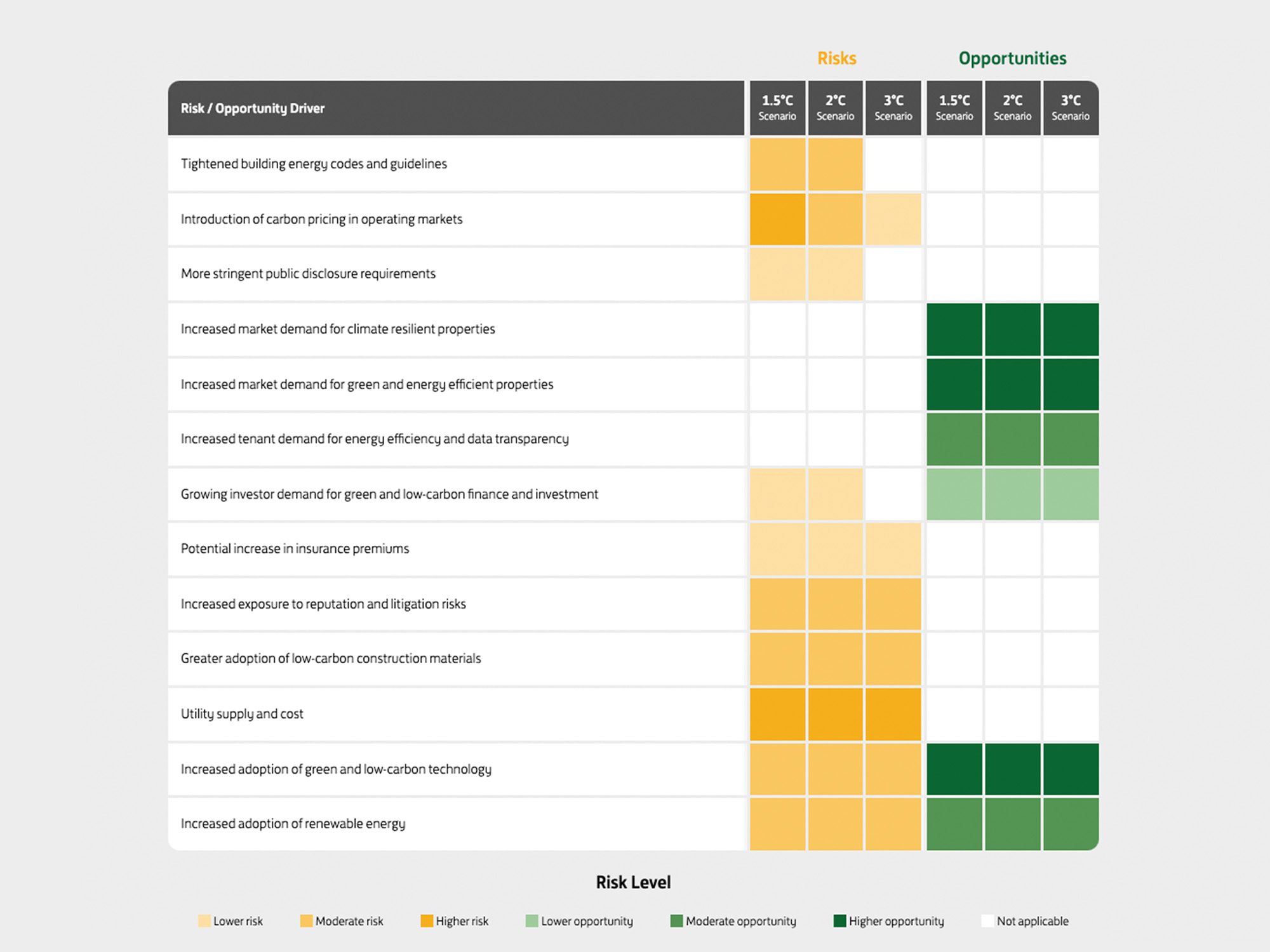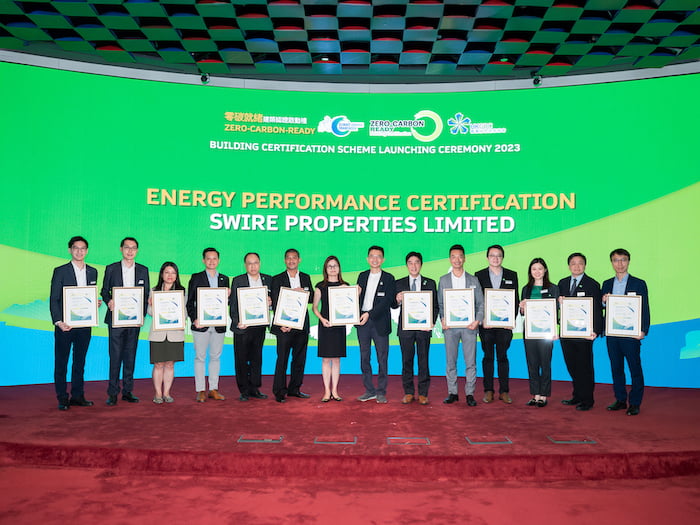Scope 1 and 2 Emissions
2023 progress against SBT Scope 1 and 2 targets for 2025 and 2030
Attributing factors to year-on-year changes in Scope 1 and 2 carbon emissions
[1] Carbon emissions rebound associated with increased economic activity upon the post-pandemic recovery. |
In 2023, Swire Properties achieved a 29% absolute carbon reduction compared to the 2019 baseline for our global portfolio. Throughout the year, we continued to adopt innovative low-carbon technologies and management practices and invest in energy efficiency research and development. An increase in energy demand was observed at some of our portfolios due to increase in cooling load and footfall in malls and office towers as the COVID-19 pandemic situation was generally improved.
On top of our continuous rollout of energy saving strategies across our portfolios, Swire Properties explored innovative and efficient ways to utilise the energy produced to further reduce our electricity demand. We piloted an integrated Photovoltaics, Energy Storage, Direct Current and Flexible Power System (PEDF) solution at Building No.15 and the RED at Taikoo Li Sanlitun in Beijing. The installation works was completed in 2023 and the solution is estimated to reduce energy consumption by 5-10%. Furthermore, we refined our machine learning algorithm that predicts cooling load requirements for our buildings 24 hours in advance. By combining this algorithm with a machine learning model, it can provide optimised chiller plant control suggestions for the next 24 hours to save energy and maintain stable operations.
We continued to explore opportunities to increase our on-site renewable energy generation across our portfolio and source for off-site renewable electricity, where feasible. This year, we completed the installation of PV panel systems at Dorset House at Taikoo Place. INDIGO joined Taikoo Li Sanlitun, Taikoo Hui Guangzhou and Taikoo Li Chengdu and became our fourth portfolio in the Chinese Mainland to enter into an off-site renewable electricity purchase agreement. Taikoo Hui Guangzhou continues to be powered by 100% off-site renewable electricity, achieving net-zero carbon in its annual electricity consumption for both landlord and tenant operations.
Scope 3 Emissions – Downstream Leased Assets
2023 progress against SBT Scope 3 – Downstream Leased Assets target for 2030
A 40% reduction was recorded in 2023. In 2023, the carbon intensity associated with the electricity consumption of our downstream leased assets remained stable compared to last year. This is mainly reflective of the increased in electricity demand from our office and retail tenants as the COVID-19 pandemic situation continued to improve. This year, we continued to work closely with commercial tenants to reduce their carbon footprints through a variety of tenant-engagement activities, including:
- The Green Performance Pledge, a performance-based agreement that acts as a blueprint for our landlord-tenant partnerships. So far, the programme has achieved a 20% completion rate for energy audits – over 700,000 sq ft of GPP tenanted area – with premises identifying possible energy savings of 10% or more. The “GPP Academy” was launched this year, with the aim of enhancing tenants’ abilities to improve their energy, water and waste reduction performance.
- The Green Kitchen Initiative, a platform that allows our portfolio management teams and our tenants to collaborate on sustainability-enhancing measures before fit-out and renovation projects. The guidelines are regularly reviewed to consider the latest industry technology and best practices.
- Green energy audits that help tenants identify energy-saving opportunities which have been ongoing since 2008. The findings will be distilled into actionable items to help tenants drive energy efficiency in their office premises.
Scope 3 Emissions – Capital Goods
Swire Properties is the first real estate developer in Hong Kong to contractually require low-carbon building materials for new projects. We have extended this practice to our Chinese Mainland developments.
To reduce embodied carbon emissions throughout the lifecycle of our developments, we have established performance-based targets on embodied carbon for concrete, rebar and structural steel for future projects in Hong Kong. These targets were informed by comprehensive market research and communications with industry associations such as the Construction Industry Council. Leveraging our experience of upfront carbon emissions calculations from projects in our Hong Kong portfolio, in 2022 we partnered with Tsinghua University to develop a carbon emissions calculation tool for projects in the Chinese Mainland covering the whole lifecycle stage from cradle-to-grave, including raw materials acquisition, manufacturing, transportation, construction, building operations, demolition and disposal. Since 2022, we began working with our main contractors using this tool to collect data at our Chinese Mainland new development projects.
Since 2020, we have included low-carbon procurement specifications – developed in accordance with international standards such as ISO 14067 – for construction materials such as concrete with pulverised fuel ash (“PFA”) or ground granulated blast furnace slag (“GGBS”), rebar and structural steel with recycled content. This year, we continued to work closely with our contractors and suppliers to procure these low-carbon building materials and foster better energy management at our new development sites – including Six Pacific Place, Taikoo Li Xi’an, and the residential development at Chai Wan.
Our progress against the SBT Scope 3 – Capital Goods target will be reported upon the completion of Six Pacific Place.
Future Steps
Our SBTs serve as a roadmap for our journey towards reducing greenhouse gas emissions and mitigating climate change. As we continue to make steady progress towards our 1.5°C-aligned targets, we are solidifying our dedication to sustainability. We are actively working towards having our net-zero commitment validated by the Science-Based Targets initiative (SBTi) in 2024. This verification will provide third-party validation of our efforts and ensure that our commitments align with the most rigorous scientific standards.
See More In
NaN / 3



